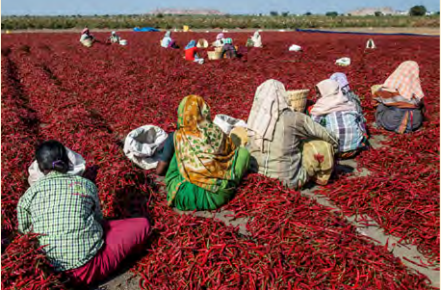In this Article
A report jointly published by the United Nations Economic and Social Commission for Asia and the Pacific (ESCAP), Asian Development Bank (ADB), and United Nations Development Programme (UNDP) examines the critical role of knowledge development, capacity building, and multi-stakeholder engagement in fostering climate resilience.

Climate change impacts agricultural and labor productivity, food supply chains, and food security, limiting countries’ ability to achieve Sustainable Development Goal (SDG) 1 – No Poverty and SDG 2 – Zero Hunger. One of the most effective ways to address the interconnected challenges of climate change, poverty, and hunger is through education and capacity building. Strengthening human resource development equips individuals and communities with the knowledge and skills necessary to navigate these challenges. Training programs improve the capacity of farmers, government representatives, enterprises, and society organizations to adjust to changes in the economy and environment. Key topics under education and skill development include climate change impacts, disaster preparedness, sustainable farming techniques, crop management, business models for ecosystem restoration, and policymaking and enterprise strategies for climate adaptation.
Despite the increasing demand for climate change-focused education, existing initiatives remain inadequate in meeting these needs. There is a need for a transformative shift to move beyond technical training and integrate skills such as coalition-building, anticipatory thinking, and decision-making in complex situations. The United Nations Framework Convention on Climate Change (UNFCCC) Paris Committee on Capacity Building highlights key gaps and capacity building needs in Least Developed Countries (LDCs), including limited financial support, inadequate access to technology and climate-related data, challenges in applying scientific information to local contexts, and weaknesses in assessing risks, implementing strategies, and engaging stakeholders effectively.
Institutions must address these gaps by evaluating the skills and requirements of target participants and developing funding guidelines to support cost-effective capacity-building initiatives. This calls for standard procedures, pre-assessment, and contextualization of materials. Monitoring and evaluating learning outcomes are crucial for identifying and replicating effective techniques.
Reference: House of Representatives. (2024, December 17). House approves bill mandating the inclusion of environmental assessment in any development strategy. Retrieved February 20, 2025 from https://www.congress.gov.ph/media/press-releases/view/?content=9186&title=House+approves+bill+mandating+the+inclusion+of+environmental+assessment+in+any+development+strategy




